Take a look at Chris Ash's resume prior to becoming the head coach at Rutgers and you'll notice a number of impressive stops as an assistant coach or coordinator including Iowa State, Wisconsin, Arkansas and Ohio State. However, unlike many coaches gunning for the head coaches table, Ash preferred to stay out of the spotlight, and instead focused on simply doing his job to the best of his ability.
While Ash was making a name for himself as a defensive backs coach before being promoted to defensive coordinator, one area he did not excel in was self promotion. Even after winning a national title with the Buckeyes, Ash was not widely considered as a "hot name" in coaching circles when it came to head coaching openings.
In an article with Whole Hog Sports, Ash talked about the challenges he faced with his out of the limelight approach, and it's something that a lot of aspiring head coaches can learn from.
"The concern for me trying to get a head coaching job was I wasn't highly regarded as a hot coach. I'm not a guy that had been necessarily trying to self-promote himself to get his name out there and become popular with the media people or with fans. That's not been me. I've been focused on trying to do a good job in the job that I have and see where that takes me."
This last season, Rutgers had Ash on their wish list, and despite being told by colleagues in the profession that you can't win in Piscataway consistently battling the likes of Michigan, Michigan State, and Ohio State, Ash took the opportunity to turn the Scarlet Knights around and to prove the doubters wrong.
"Somebody can be a very familiar person, but if they don't have a plan for putting together a great program, you're going to win the press conference but lose the long term," Rutgers athletic director Patrick Hobbs noted in the piece.
Once he became a head coach, Ash explained that the challenge became taking the all the playbooks, notes, events, and other nuggets he had accumulated from his past coaching stops and developing them into his own vision. What he took from Bret Bielema during his time at Arkansas is very different from what he took from Urban Meyer.
"There's things I'm going to bring from Bret in terms of how to develop football IQ and the mental understandings of the game and the skills at your position," Ash noted. From Meyer, the article notes that Ash learned to invest in players.
"As coaches we work for the players, not the university, because if it weren't for the players and the connection that we can build with the players and the development that we can create with the players, we wouldn't have a job."
"I'm not trying to be Urban Meyer. I'm not trying to be Bret Bielema. I'm not trying to be anybody else. I'm trying to be myself, but a lot of my beliefs in how they run their programs is what I believe in. There's discipline, there's structure, there's accountability, there's development. There's attention to details. There's a focus on recruiting."
Ash is a prime example of doing a great job, doing it the right way, focusing on making his current team as good as possible, and being a sponge to the quality coaches around him, and teams will eventually notice that.
